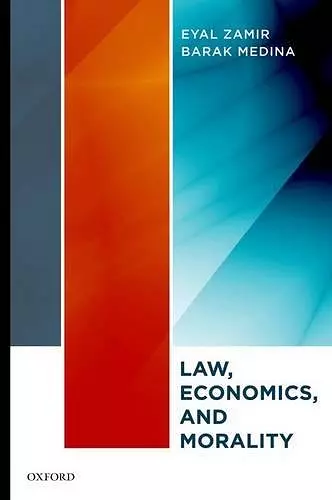Law, Economics, and Morality
Barak Medina author Eyal Zamir author
Format:Hardback
Publisher:Oxford University Press Inc
Published:8th Apr '10
Currently unavailable, and unfortunately no date known when it will be back

Law, Economics, and Morality examines the possibility of combining economic methodology and deontological morality through explicit and direct incorporation of moral constraints into economic models. Economic analysis of law is a powerful analytical methodology. However, as a purely consequentialist approach, which determines the desirability of acts and rules solely by assessing the goodness of their outcomes, standard cost-benefit analysis (CBA) is normatively objectionable. Moderate deontology prioritizes such values as autonomy, basic liberties, truth-telling, and promise-keeping over the promotion of good outcomes. It holds that there are constraints on promoting the good. Such constraints may be overridden only if enough good (or bad) is at stake. While moderate deontology conforms to prevailing moral intuitions and legal doctrines, it is arguably lacking in methodological rigor and precision. Eyal Zamir and Barak Medina argue that the normative flaws of economic analysis can be rectified without relinquishing its methodological advantages and that moral constraints can be formalized so as to make their analysis more rigorous. They discuss various substantive and methodological choices involved in modeling deontological constraints. Zamir and Medina propose to determine the permissibility of any act or rule infringing a deontological constraint by means of mathematical threshold functions. Law, Economics, and Morality presents the general structure of threshold functions, analyzes their elements and addresses possible objections to this proposal. It then illustrates the implementation of constrained CBA in several legal fields, including contract law, freedom of speech, antidiscrimination law, the fight against terrorism, and legal paternalism.
"For far too long, normative legal theory has been unable to move beyond unproductive debates. Eyal Zamir and Barak Medina have been at work on another way-an approach to cost benefit analysis that is sensitive to moral constraints and permissions but preserves the rigor and formalization that are among the chief virtues of the economic analysis of law. Transcending the fairness-versus-welfare debate, the authors have written an erudite, careful, and truly original book that must be read by legal economists and their critics." --Lawrence B. Solum Associate Dean for Faculty and Research, John E. Cribbet Professor, University of Illinois College of Law "This book proposes a rigorous decision procedure for evaluating government projects on the basis of both their impact on public well-being and their consistency with deontological commitments. The authors make their case with meticulous care, and offer the best hope for bridging the divide between cost-benefit analysts and their foes. Everyone interested in that debate should read this book." --Eric Posner Kirkland & Ellis Professor of Law, The University of Chicago Law School "This is a clear, sophisticated, and illuminating defense of threshold deontology, a moral stance as important in practice as it is in theory. The authors manage to be both rigorous and reasonable, itself an unusual feat. Their work deserves to be, and will be, highly influential in legal theory and elsewhere." -- Adrian Vermeule John H. Watson, Jr. Professor of Law, Harvard Law School "Economists and moral philosophers have long been talking mostly at each other about vital issues of law and public policy. Enter Zamir and Medina, who elegantly integrate philosophical insight with the economists' rigor to create a unified discourse that promises to invigorate and deepen the academic discussion of law and policy in the years to come." -- Meir Dan-Cohen Milo Reese Robbins Professor of Law, UC Berkeley School of Law
ISBN: 9780195372168
Dimensions: 234mm x 156mm x 22mm
Weight: 703g
376 pages